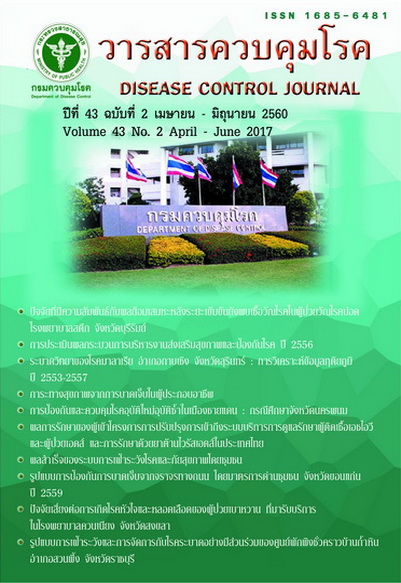Factors associated with sputum smear positive after intensive phase of treatment in pulmonary tuberculosis, Satuek Hospital, Buriram Province
DOI:
https://doi.org/10.14456/dcj.2017.21Keywords:
pulmonary tuberculosis, risk factors, sputum smears positive after intensive phaseAbstract
Background: Tuberculosis remains the major public health problem of Thailand. In Satuek Hospital, the incidence of pulmonary tuberculosis patients has increased steadily. In the intensive phase of treatment, it is critical to reduce the spreading of tuberculosis to other people. This objective of this study is to determine the factors associated with sputum smears not converted after intensive phase in pulmonary tuberculosis in Satuek Hospital during the years 2011-2015. Methods: Retrospective cohort study was performed to identify possible risk factors relevant to delay or non-conversion after intensive phase. Univariate and multivariate analyses were used to estimate risk ratio and adjusted odds ratio with 95% confidence interval. Result: The pulmonary tuberculosis patients enrolled in this study was 232 and sputum smears positive were 218 (93.63%). The sputum smears remained positive after intensive phase of treatment was 11.93%. The means age was 56.69 years (SD = 15.38). The majority of signs and symptoms were chronic cough (76.92%), hemoptysis (42.30%) and weight loss (19.23%). In multivariate analysis only age group >40 years (adjusted OR = 2.88, 95% CI = 1.31-9.34) and sputum acid-fast bacilli grades 3+ initially was 2 significant factors. (adjusted OR = 4.18, 95% CI = 1.43-12.22) Conclusions: The risk factors associated with sputum smears positive after intensive phase of treatment was age group >40 years and sputum acid-fast bacilli grades 3+ prior to treatment. Recommendation: surveillance in patients age group >40 years, or sputum acid-fast bacilli grades 3+ initially, sputum culture and DST (drug susceptibility testing) before starting treatment and conduct active cases finding in community and risk population should be implemented.
Downloads
References
2. B Samb D. Henze, CL Daley. Methods for diagnosing tuberculosis among in-patients. Int J Tuberc Lung Dis, 1997;1:25-30.
3. World Health Organization. Treatment of tuberculosis: guidelines for national programmed. Geneva: World Health Organization; 2003.
4. American Thoracic Society, Centers for Disease Control and Prevention, Infectious Diseases Society of America. Treatment of Tuberculosis. Am J Respir Crit Care Med 2003;167:603-62.
5. Telzak EE, Fazal BA, Turett GS, Justman JE, Blum S. Factors influencing time to sputum conversion among patients with smear-positive pulmonary tuberculosis. Clinical infectious diseases 1998;26:775-6.
6. Banu Rekha VV, Balasubramanian R, Swaminathan S, Ramachandran R, Rahman F, Sundaram V, et al. Sputum conversion at the end of intensive phase of category-1 regimen in the treatment of pulmonary tuberculosis patients with diabetes mellitus or HIV infection: An analysis of risk factors. Indian J Med Res 2007;126:452-8.
7. Pajankar S, Khandekar R, Al Amri MA, Al Lawati MR. Factors influencing sputum smear conversion at one and two months of tuberculosis treatment. Oman medical journal 2008;23:263
8. Aylin Babalık, Sule Kızıltas, Hülya Arda, Korkmaz Oruç, Gülgün Çetintas, Haluk Celalettin Çalışır. Factors affecting smear conversion in tuberculosis management. Med-Science 2012;1: 351-62.
9. Unsematham S, Kateruttanakul P. Factors predicting sputum smear conversion and treatment outcomes in new smear-positive pulmonary tuberculosis. J Med Assoc Thai 2013;96:644-9.
10. Behnaz F, Mohammadzadeh M, Mohammadzade G. Five-year assessment of time of sputum smears conversion and outcome and risk factors of tuberculosis patients in central Iran. Tuberculosis research and treatment 2015;DOI:609083.
11. Djouma FN, Noubom M, Ateudjieu J, Donfack H. Delay in sputum smear conversion and outcomes of smear-positive tuberculosis patients: a retrospective cohort study in Bafoussam, Cameroon. BMC infectious diseases 2015;15:139.
Downloads
Published
How to Cite
Issue
Section
License
Articles published in the Disease Control Journal are considered as academic work, research or analysis of the personal opinion of the authors, not the opinion of the Thailand Department of Disease Control or editorial team. The authors must be responsible for their articles.






